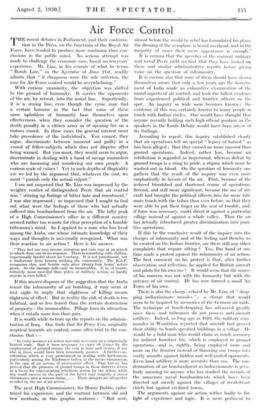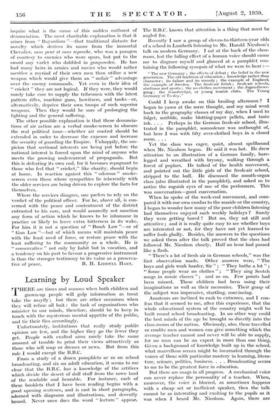Air Force Control
THE recent debates in Parliament, and their continua- -1- tion in the Press, on the functions of the Royal Air Force, have tended to produce more confusion than con- clusions in the public mind. No serious attempt was made to challenge the economic case, based on ten years' experience. Mr. Lias, in his censure of what he terms " Bomb Law," in the Spectator of June 21st, readily admits that " if cheapness were the sole criterion, the case for Air Force control would be overwhelming."
With curious unanimity, the objection was shifted to the ground of humanity. It carries the opponents of the air, by retreat, into the moral line. Superficially, it is a strong line, even though the cynic may find a certain humour in the fact that some of these same upholders of humanity base themselves upon effectiveness when they consider the question of the death penalty in a citizen army or of opening fire on a riotous crowd. In these cases the general interest must take precedence of the individual's. You cannot, they argue, discriminate between innocent and guilty in a crowd of fellow-subjects which does not disperse after being warned. But you must, they would seem to argue, discriminate in dealing with a band of savage marauders who are harassing and murdering our own people. A curious scale of values ! Yet to such depths of illogicality are we led by the argument -that, -whatever the cost, we must " punish only the actual culprit."
I am not surprised that Mr. Lias was impressed by the weighty verdict of distinguished Peers that air control was " stirring up feelings of bitter hate and resentment." I was also impressed ; so impressed that I sought to find out what were the feelings of those who had actually suffered this bombardment from the air. The lofty peak of a .High Commissioner's office in a different country seemed rather too remote for clear perception of a humble tribesman's mind. So I applied to a man who has lived among the Arabs, one whose intimate knowledge of their ways and thoughts is universally recognized. What was their reaction to air action ? Here is his answer.
"They feel our own intense irritation and vain rage at an attack to which there can be no response. There is something cold, chilling. impersonally fateful about air bombing. It is not punishment, but a misfortune from heaven striking the community. The R.A.F. recognizes this, and bombs only after twenty-four hours' notice given. So the damage falls only on immovables. It is, of course. infinitely more merciful than police or military action, as hardly anyone is ever killed."
If this answer disposes of the suggestion that the Arabs resent the inhumanity of air bombing, it may seem at first sight to imply that slightness of killing means slightness of effect. But in reality the risk of death is too habitual, and so less feared than the certain destruction of property—the immovables. Pillage loses its attraction when it entails more loss than gain.
It is worth while to turn up the reports on the adminis- tration of Iraq. One finds that Sir Percy Cox, originally sceptical towards air control, came after trial to the con- clusion that :-
" In every instance air action was only necessary on a surprisingly limited scale. Had it been necessary to exact ob-.:1"ence by the employment of ground troops, the cost in tune and money, if not also in lives, would have been immensely greater. A further con- sideration which is very pronounced in dealing with lawlessness, particularly among the Euphrates tribes, is the entire elimination, in the case of air action, of provocative effect. Past history has proved that the presence of ground troops in these districts serves as a focus for concentrating rebellious action by the tribes, while any small success on the part of the latter may magnify a minor disturbance into a serious rising.... These dangers are altogether avoided by the use of air action."
• The next High Commissioner, Sir Henry Dobbs, epito- mized his experience, and the contrast between old and nest `methods, in this graphic sentence : " But now,
almost before the would-be rebel has formulated his plans, the droning of the aeroplane is heard overhead, and in the majority of cases their mere appearance is enough."
It is curious that the speeches of the eminent military and naval Peers yield no hint that they have looked up these and similar administrative reports before giving voice on the question of inhumanity.
It is curious also that none of them should have shown themselves aware that only a few years ago the Govern- ment of India made an exhaustive examination of the moral aspects of air control, and took the fullest evidence from experienced political and frontier officers on the spot. An inquiry so wide soon becomes known ; the existence of this was certainly known to many people in touch with Indian circles. One would have thought that anyone recently holding such high official position as the speakers in the Lords Debate would have been aw,:re of its findings.
According to report, this inquiry established clearly that air operations left no special " legacy of hatred " as has been alleged ; that they caused no more rancour than ground operations. Indeed, rather less, because air retribution is regarded as impersonal, whereas defeat by ground troops is a sting to pride, a stigma which must he washed out in blood. On the question of humanity One gathers that the result of the inquiry was even more emphatically in favour of the air. First, because of the reduced bloodshed and shortened course of operations. Second, and still more significant, because the use of air- craft had brought the political officers into far more inti- mate touch with the tribes than ever before, so that they were able to put their linger on the seat of trouble, and, if force was necessary, could direct it against a particular village instead of against a whole valley. Thus the air has actually introduced greater discrimination into puni- tive operations.
If this be the conclusive result of the inquiry into the charges of inhumanity and of the feeling said thereby to be created on the Indian frontier, arc there still any other complaints that require sifting ? Yes, Ihn Saud at one time made a protest against the inhumanity of air action. The best comment on his protest is that, after further observation and reflection, he applied for British aircraft and pilots for his own use ! It would seem that the source of his-concern was not with the humanity but with the potency of air control. He has now formed a small Air Force of his own.
There is also the charge, echoed by Mr. Lias, of " drop- ping indiscriminate missiles " ; a charge that would seem to be inspired by memories of the German air raids. The technique of bomb-dropping has advanced greatly since then—and tribesmen do not possess anti-aircraft artillery. Indeed, as long ago as 1919, the military com- niander in Waziristan reported that aircraft had proved their ability to bomb specified buildings in a village. Ile would be a bold man who would claim as much accuracy for indirect howitzer fire, which is employed in ground operations—and is, rightly, being employed more and more on the frontier instead of throwing our troops into costly assaults against hidden and well-posted opponents. Even land artillery is more accurate than sea. The con- demnation of air bombardment as indiscriminate is !yeti- liarly. amusing to anyone who has studied the records of the numerous naval bombardments which have been directed not merely against the villages of recalcitrant chiefs but against civilized towns.
The arguments against air action wither badly in the light of experience and logic. It is more pertinent to
inquire what is the cause of this sudden outburst of denunciation. The most charitable explanation is that it arises from " Bayardism "—that traditional distaste for novelty which derives its name from the immortal Chevalier, sans pear et sans reproche, who was a paragon of courtesy to enemies who wore spurs, but put to the sword any varlet who dabbled in gunpowder. He has had many heirs in armies and navies who would rather sacrifice a myriad of their own men than utilize a new weapon which would give them an " unfair " advantage over the enemy commands. Yet even in their idea of " cricket " they are not logical. If they were, they would surely take care to supply the tribesmen with the latest pattern rifles, machine guns, howitzers, and tanks—or, alternatively, deprive their own troops of such superior weapons. Then they would be sure of prolonging the fighting and the general suffering.
The other possible explanation is that these denuncia- tions of air action are a verbal smoke-screen to obscure the real political issue—whether air control should be ex tended in order to decrease the expense and increase the security of guarding the Empire. Unhappily, the sus- picion that sectional interests are being put before the national interest is forced upon the mind of anyone who meets the growing undercurrent of propaganda. But this is defeating its own end, for it becomes repugnant to those who feel that " cricket," like charity, should begin at home. In reaction against this " odorous " smoke- screen even those whose sympathies lie inherently with the older services are being driven to explore the facts for themselves.
Where the services disagree, one prefers to rely on the verdict of the political officer. For he, above all, is con- cerned with the peace and contentment of the district entrusted to his care, and would assuredly not sanction any form of action which he knows to be inhumane in practice or likely to leave extra bitterness in its wake. For him it is not a question of " Bomb Law "—or of " Gun Law "—but of which means will maintain peace with the least need of force, or restore peace with the least suffering to the community as a whole. He is " conservative " not only by habit but in vocation, and a tendency on his part to favour a progressive instrument is thus the stronger testimony to its value as a preserva-

































 Previous page
Previous page